
*
Fran Weissler, 82, one half of the husband-and-wife Broadway producing team of Fran and Barry Weissler, will have three Broadway shows running this fall, when the new musical The Scottsboro Boys opens at the Lyceum Theatre in October. For La Cage aux Folles, now at the Longacre, she and her husband of 42 years took home their sixth Tony Award — it won Best Revival (Musical). Over at the Ambassador, the Weisslers' smash revival of Chicago is now in its 14th year. Weissler's Broadway shows with her husband have included Falsettos (a Best Book and Score Tony Award winner), Annie Get Your Gun with Bernadette Peters, Gypsy with Tyne Daly, Cat on a Hot Tin Roof with Kathleen Turner, My Fair Lady starring Richard Chamberlin and Kander & Ebb's Zorba with Anthony Quinn, among others. On the horizon for the Weisslers is another revival of Zorba (in 2011-12) starring Antonio Banderas. We caught up with Fran Weissler in the days leading up to the launch of the current pre-Broadway Guthrie Theater engagement of The Scottsboro Boys.
The Scottsboro Boys had a successful Off-Broadway run in the spring, and now you and Barry are bringing it to Broadway. You wanted the interim engagement at the Guthrie in Minneapolis to be a place to work on it — to make it even better.
Fran Weissler: We're really tweaking it. We added a song, we took away a song. Susan [Stroman] and John [Kander] and Tommy [librettist David Thompson] have a chance now to do it again. You look at what you've done and think, "I did it. Now I have the time to really look at it, and maybe I can do more." Every day, something new happens. We have a few new actors on top of that, so it's very exciting.
You really are the breed of producers who are hands-on, right?
FW: We're so hands-on that it's nauseating! [Laughs.] You know something? It's because this is what we do for a living. It's not like we own theatres, or we have another business and this is a very exciting hobby. This is really what we do.
You give notes to the artists? That kind of hands-on?
FW: We only give notes to the director, and if anyone is on board with us — any other producers — in any contract we are very strong about [this]: If you have any notes to give, they're only to be given to Barry or me or in some cases to the director. But never to an actor or never to a designer or anyone like that. And you can't — I've seen or heard horror stories. You see over the title now 1,000 producers. It's like, you're thinking, "Whose store is this?" [Laughs.] Can you imagine all of them giving notes? I'm curious about how producers find new works. Are you attending readings and workshops and sniffing out new material?
FW: We have people in this office [whose] only job is [that] they're new project coordinators. All they do is go out [to see plays and musicals] — sometimes to [different] parts of the country. But mainly, there's so much happening in New York…there's always readings, there's always workshops, and their job is to go to all of those. And also we get, like, 20 scripts a week. We get a lot of scripts, so our advice to them is, "You must read 30 pages. At the end of 30 pages, if you can't stand it, you don't have to read it anymore. [Laughs.] But read that much." And sometimes, out of 80 a month, you end up maybe with three a year.
There have certainly been developmental things that you guys have sponsored readings of, or workshops of — or even out-of-town — that didn't necessarily see the light of day. But there is a developmental passion on your part.
FW: Yeah, we're very into that. And also, any revival that we've done, we always treat it as if it's a brand-new piece. We never think of it as a revival. We always think, "Why are we doing it? What can we do with this incredible show to make it more fresh and even more exciting to an audience and to today's audience?" I've always been a little appalled at people that frown on revivals. I hate the word because it connotes something old, etc. But there's a whole group of young theatregoers who never have seen My Fair Lady or West Side Story or Gypsy or any of the great, great shows. So it needs some producers who are gonna look at these things and hopefully revive them and make them fresh and wonderful again. I don't believe in reviving something and working with a director that says, "Let's just do it the way it was done," and following all the same blocking and not casting it adventurously. Right now, both of our shows — La Cage and Chicago — are revivals, but somehow the revivals we've done of them have been so excitingly directed and choreographed that we've done a little more than the public expected them to be. So that's very exciting for us.
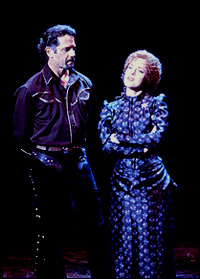 |
||
| Tom Wopat and Bernadette Peters in Annie Get Your Gun |
FW: No, usually, it starts out with Barry and I thinking about, "Shall we do this?" and "Why should we do this?" — and then hiring the people around it. With Cat on a Hot Tin Roof a long, long time ago, at that time Kathleen Turner had just come off "War of the Roses." She was the hottest young actress in Hollywood, just gorgeous and young and [had made] a very exciting movie with Michael Douglas. I think it was [The New York Post's] Page Six [that] talked to [her] and said, "Would you ever do theatre?" and she said, "Only if I could do Maggie." And we knew that was Maggie in Cat on a Hot Tin Roof. [Laughs.] I read the article, called her agent the minute after I read the article, and within a week, she was in our office, the agent was in our office and we had signed her. We [did] it because of a little blurb in the New York Post. So you never know! Is there a wish list of shows that you want to do?
FW: There's all kind of things we want to do, but I don't know if we'd call it a wish list. Usually, we kind of make it happen. We're very stubborn, or "tenacious" is probably a better word. We get an idea that we want to do something and we really beat it to death. [Laughs.] We're very ambitious about the things we want to do, and we work very hard to accomplish them.
Can you give us a couple of titles of shows you're developng?
FW: We're working on [stage musicals of the films] "Waitress" and "Working Girl." That's all I can say at the moment.
When we met at the Tony nomination press event this past spring, we were talking about the move of La Cage from London to Broadway, and I asked if actor Douglas Hodge was a must-have for the move. And you quickly said, "Yes," and Barry said, "Wellll…"
FW: [Laughs.] The reason he said, "Well," was — what if we couldn't get him? If you can't get him, we're not gonna do the show? We were going to do the show, but I thought, "If I don't get Doug Hodge, I'll kill myself." [Laughs.] And then, of course, the glue, also, that holds the show together was getting Kelsey Grammer. I mean, God — he's the surprise. Nobody knew, and he's just so comfortable in the role, and he makes the audience comfortable. That's no mean feat, by the way.
I couldn't help wondering if your apparently conflicting comments ("Yes!" and "Well…") sort of illustrated you two as a couple — that you were always looking at the art and the talent and maybe he's looking at the availability and the price, in a way. Is that accurate?
FW: Well, you know something? Barry is the driving force behind our business. Truly, he is. I could not run this business. That's not what I do. I only work in the creative, so I work in all the auditions. I deal with the director, the choreographer, the designers, all of that. As does Barry, but also, there is a business, and the bottom line is you have to have people sitting in seats to see the shows that we've created, and that's his job. Things like promotion, advertising, things of that sort, are the kind of things Barry's very, very involved in. Promoting the show and advertising the show is very important to him, and he's really good at it.
And he deals with contracts?
FW: Anything to do with it. We have a marvelous staff, so we have people that do 90 percent of the contracts now. At one point, it was all Barry, but he still will do, probably, the major stars. He might do one or two contracts…but he doesn't do that as much as he used to. But the tours and where we're going on the tour — he gets involved in all of that, whereas I just fly to the good places. [Laughs.]
And when you send your scouts out to look for new product, are they mostly reporting to you about the creative and then you discuss it with Barry, or are you both equal partners on that?
FW: We're both equal partners on that. They really meet with both of us, and usually we're in the same room with them. First, they send it to us in writing, and then if it looks good, we meet with them and talk about it.
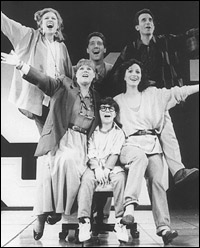 |
||
| The original Broadway cast of Falsettos |
||
| photo by Carol Rosegg |
FW: I'm proud of so much of our work, and as I said, we're so hands-on, so all of it is very meaningful to us. We've never phoned it in, in any way. But I think probably I'm the most proud of Falsettos, which was written by Bill Finn and James Lapine. I loved that show, and it was a very hard show to raise money for and a hard show to sell because at that time, it was about Jewish, gay, AIDS — nothing that anybody wanted to think about or focus on. And we paid that show back in 26 weeks, which we couldn't believe, and it won so many Tonys for James and for Bill. I just can't tell you how exciting that was to have so much — not negativism, but opposition to it, and for us to think, "We've got to do it. We just have to do this," because we loved it so much. And then to make it happen, and to have it be a success…
Falsettos said something about the times we live in, as well, which is so rare for musical theatre.
FW: I feel that way now about our newest show, which is The Scottsboro Boys. I feel very strongly about what is being said about a time that was really a stain on America's history. It was a bad time, 1928-32, if you were black in America. So the fact that we're doing this is very gratifying to me and I'm very, very excited about it.
There have been some tantalizing titles that I know have been part of your producing past. Shows that, like I said, were in readings or were in workshops or didn't come in. There was an interesting tour of Applause that I saw on the road.
FW: Applause with Stefanie Powers. Never [came to Broadway]. And Seussical sort of happened but then didn't succeed.
And you had money in The Band Wagon — or Dancing in the Dark — which tried out the West Coast.
FW: Yes. [Laughs.]
Is The Band Wagon not going to happen?
FW: I don't know if it'll happen. There are people out there, whom I can't discuss right now, who feel that it still has a shot. I'm not sure, but there's a lot of very strong thinking about it. I hope we can make it happen. I can't tell you how much I want it to happen. You just never know. We wanted to do The Blue Angel. That's Barry's baby — it's something he's always wanted to do. We've been doing it now, it seems, for three years, and it isn't happening yet. Hopefully it will. We came so close with Clueless. It still might happen. We have someone in our office who believes in it and who's working on it with new people, and it might actually happen. But there [have been many] shows that we really put six months to a year of our lives in, and it didn't happen the way we wanted it to. The fact that we've produced, I believe it's 27 Broadway shows, is terrific. I mean, I'm beside myself that at least we were able to accomplish that. We won six Tonys, thank goodness, and we've done it, as I said, by doing it the hard way, which is really the only way.
And weren't you attached at one point to the musical The Royal Family of Broadway, based on The Royal Family? Could it happen eventually?
FW: I don't think it'll happen for us. …That was so hard.
And your Busker Alley folded on the road…
FW: We did Busker Alley with Tommy [Tune] and then The Royal Family with Jerry Zaks and Elaine Stritch, and all these wonderful people, and it didn't do what we wanted it to do.
I'm one of the people who doesn't really know how you and Barry met.
FW: We lived in New Jersey then, and I had two children and was in the process of getting separated, and a friend of mine called and asked if I would take tickets at a box office…in West Orange, NJ. This was on a Sunday, and I said, "I can't do that because I cannot add and subtract, and I will not be able to give the money back," and I really meant it. And she said, "Are you out of your mind?" I said, "No, you don't understand." It's not like today where they spell it out for you and you know the change. They didn't have that then, and honest to God, I can't add and subtract. So I said, "I'm not doing that." So an hour and a half goes by — the woman who was supposed to do it had the flu, so she calls me back and she's coughing and sneezing, and she said, "Fran, I have called 20 women and every single one of them can't make it today. You're free. You've got to do this for me."
So I go, and there was a company performing Taming of the Shrew. Barry was a producer, a director, he was everything in the company, and he was playing a servant.
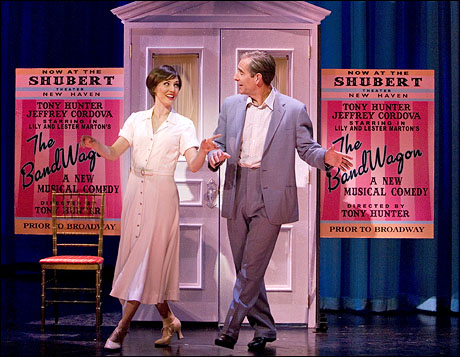 |
| Mara Davi and Scott Bakula in Dancing in the Dark |
| photo by Craig Schwartz |
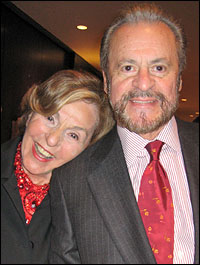 |
||
| Fran and Barry Weissler |
||
| photo by Joseph Marzullo/WENN |
One of my best friends happened to be Catholic, and I called her and I'm whining about how I have no idea how I'm gonna live the rest of my life especially if I get involved with this man and about the schools and [how] they can't charge. And she said, "Why don't you go to the Catholic schools? They're private schools. They'll charge." And I remember saying, "I've never been to a Catholic school and I've never met a priest or a nun" — 'cause we both happen to be Jewish. And she said, "Well, they don't have horns any more than you do. [Laughs]. Fran, are you crazy? I'm gonna call my nun at St. Aloysius in Jersey City and you go there and you talk about theatre." And that's what we did. For 18 years, we played the Catholic school system. That's all we did. …And then when my kids got old enough to go to college and they were both out of the house, that's when we decided to go to Broadway. And the reason our first show was Othello was all we knew was Shakespeare or Shaw or classical theatre.
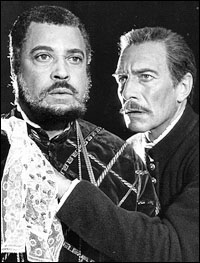 |
||
| Jmaes Earl Jones and Christopher Plummer in the Weisslers' 1982 Othello |
||
| photo by Martha Swope |
FW: Yes, or Shaw, or anything. We did Antigone, we did Sophocles, Euripides, we did anything they were studying. And we had study guides that we sent out six months in advance, and at the termination of each show, we had a symposium whereby the actors came out and talked to the students. So it was really a very exciting time for us, and we were doing theatre. We had one company, and then over a period of time we ended up with eight companies, eight U-Hauls, eight station wagons, going across the country.
You introduced a generation of people to Shakespeare and the classics.
FW: We did. When we got to be on Broadway, we got so many letters from so many nuns and so many priests.
Your shows were literally all over the country? Are we talking California?
FW: No, we only went as far as Illinois. We went [to] Maine, New Hampshire, Vermont, all the way across, only to Chicago. But that's a lot, because how many high schools [are] in one town? There's one or two, at least. And you made more than a living off of this?
FW: At the beginning, we didn't have any money, and my father helped to support us. And my father was not rich, he was okay, and it killed me that my father was helping us. And then our first year, we made $15,000. We thought we were so wealthy, I can't even begin to tell you, it was like a miracle! And then over a period of time, I trained other salespeople to do what I did, and they lived in different parts of the country and they sold our shows.
This is from the woman who couldn't count change.
FW: I know it, I know it! But I'm a good salesman. [Laughs.]
And did you grow up going to the theatre? Did your folks take you?
FW: Nothing, nothing. I went, like, three times.
Are you a New Jersey girl?
FW: No, my husband comes from Jersey City. I come from Boston, but now that I've lived in New York so long, I sound like Chicago. That's what they tell me. I still say, "Pahk the cah." [Laughs.]
No passion for theatre as a kid or no exposure?
FW: No, not in the least. Not that I didn't think it was wonderful, but I never had any real exposure to it. I truly didn't. And then when I lived in New Jersey, to go to Broadway was a very big deal and very expensive. So I went two or three times, but now, my God, I think, "How did I live without it?"
(Kenneth Jones is managing editor of Playbill.com. Write to him at [email protected].)









